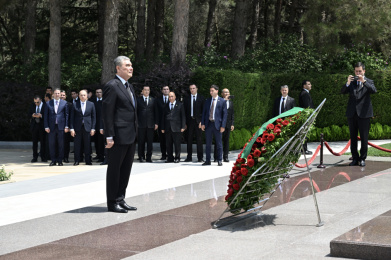A new university for business and innovation: the International University of Industrialists and Entrepreneurs
16.07.2025 | 15:07 |The current week marks the traditional summer commencement of the admissions campaign for higher and secondary vocational educational institutions in our country, with a new addition to their ranks. For the first time, the International University of Industrialists and Entrepreneurs, a new higher education institution in our country, is opening its doors to its inaugural cohort of first-year students. The objectives of this new university were discussed by its Vice-Rector for Scientific Affairs, Aymyrat Muhammedov, in the newspaper "Neutral Turkmenistan".
The International University of Industrialists and Entrepreneurs is the first higher educational institution in the country dedicated to training professionals for the private sector and the new economy. Notably, this university is the first in our nation's history to be established by the private sector, operating under the auspices of the Union of Industrialists and Entrepreneurs of Turkmenistan.
The university will be situated on a modern, 8-hectare campus. Its architectural concept integrates scale and functionality, featuring four six-story academic buildings, two student dormitories, each with a 300-bed capacity, a nine-story administrative building, conference halls, a library, an assembly hall, a sports complex, and open recreational spaces, including dedicated areas for student project work.
The structure of the International University of Industrialists and Entrepreneurs of Turkmenistan comprises six faculties, including a Department of Foreign Languages. These faculties encompass key areas crucial for the development of the private sector.
A distinctive feature of the academic model will be the consolidated training approach in the first year. To clarify this term, consolidated specialist training in universities involves combining related specialties into broader groups, referred to as "areas of study." Simply put, it is the grouping of several specialties into a single category.
Students will be admitted not to specific areas of study, but to consolidated groups of educational fields that encompass multiple study directions. During their first year, students will undergo language training. In their second year, they will initially master compulsory and foundational disciplines within their broad field. Subsequently, based on accumulated scores, personal interests, and aptitudes, they will be allocated to specific specializations. This approach fosters informed career choices, enhances motivation for learning, and contributes to the development of competent, proactive professionals. These consolidated groups include fields such as architecture; engineering and construction technologies; informatics and computer engineering; mechanical engineering; agriculture, forestry, and fisheries; veterinary medicine and animal science; economics and management; and jurisprudence.
The Faculty of Economics and Business Management will serve as the core for training professionals for both the national private sector and international business cooperation. Its curriculum will include disciplines such as accounting, auditing, international trade, logistics, entrepreneurship, and corporate governance. Special emphasis will be placed on practical business situation modeling, digital management tools, and modern analytical systems.
Graduates of this faculty will be equipped for careers in private entrepreneurship as well as in large corporations, serving as economists, financial consultants, logisticians, export managers, and startup executives. The establishment of their own ventures and participation in accelerators and incubators will also be integral to the educational strategy.
The Faculty of Architecture and Construction Entrepreneurship aims to cultivate a new generation of specialists who combine engineering competence with an entrepreneurial mindset. The educational process will cover areas such as architectural design, industrial and civil construction, urban environment design, and construction project management.
A particular focus will be placed on training professionals for sustainable development, the implementation of innovative construction technologies, and digital design tools (BIM modeling, CAD/CAM). Graduates of this faculty will be highly sought after as architects, structural engineers, developers, designers, and managers of construction and investment projects. This faculty will shape the future authors of Turkmenistan's urban landscape.
The Faculty of Agricultural Entrepreneurship will serve as the intellectual foundation for the development of Turkmenistan's agricultural sector, facilitating its transition to sustainable and high-tech farming practices. The educational program encompasses agronomy, animal science, veterinary medicine, food technologies, agricultural economics, aquaculture, and food supply chain logistics.
The faculty's laboratory and practical facilities will include modern greenhouses, agrochemical laboratories, veterinary stations, and research centers for product quality control. Future specialists will be able to effectively manage agribusinesses, implement digital solutions in agriculture, engage in the processing and export of agricultural products, and develop sustainable farms.
The Faculty of Digital Technologies will be a focal point for future leaders in digital transformation. Training programs will cover programming, information systems, cybersecurity, web development, automation, and business analytics. Instruction will be based on international standards, incorporating modern programming languages, cloud technologies, AI tools, and machine learning.
A Faculty of Professional Development is also planned, which will fulfill the strategic function of continuous professional growth. It will offer retraining courses, business programs, modules for active entrepreneurs, and master classes featuring international experts.
The Department of Foreign Languages will be fundamental to fostering a multilingual academic environment. The study of English and other languages will be a mandatory component of the curriculum, equipping graduates with linguistic skills for international communication, academic exchange, and participation in global projects. Modern methodologies, multimedia technologies, and language laboratories are planned. The department will also oversee the preparation of students for international language examinations, academic mobility, and participation in bilateral programs with foreign universities.
In the 2025-2026 academic year, the university plans to admit up to 500 students. The areas of study cover over 15 in-demand specializations.
Concurrently, a system of mentorship, dual education, business projects, and startup accelerators will be implemented. Every student will have the opportunity to realize their ideas, ranging from technological developments to innovative businesses.
One of the university's strengths will be its laboratories and research centers. The university will house over 40 laboratories equipped with state-of-the-art equipment for work in areas such as digital technologies and supercomputers, production automation, ecology, selection, genetics and biotechnology, international finance, stock exchange trading, marketing, and others. Here, students will not only acquire theoretical knowledge but also participate in real scientific projects and startups.
ORIENT











